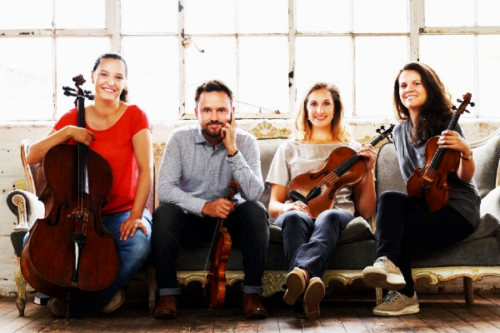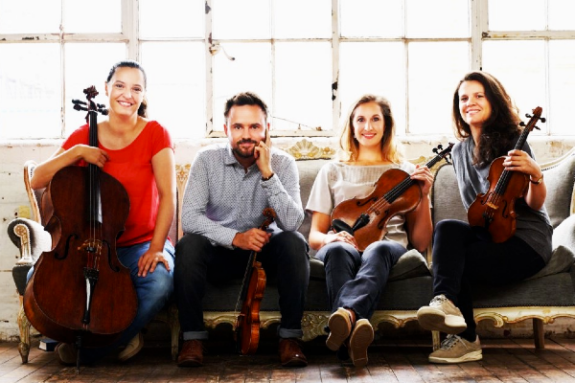 United Kingdom Mozart, Beamish: Elias String Quartet (Sara Bitlloch and Donald Grant [violin], Simone van der Giessen [viola], Marie Bitlloch [cello]), Robin Ireland (viola). Turner Sims, Southampton, 5.12.2024. (CK)
United Kingdom Mozart, Beamish: Elias String Quartet (Sara Bitlloch and Donald Grant [violin], Simone van der Giessen [viola], Marie Bitlloch [cello]), Robin Ireland (viola). Turner Sims, Southampton, 5.12.2024. (CK)

Mozart – String Quintet in D, K593; String Quintet in G minor, K516
Beamish – Epilogue
A mood of autumnal wistfulness hung over a well-filled Turner Sims in these lovely performances by the augmented Elias String Quartet: a mood that Mozart’s moments of lightness and energy could not entirely dispel. Each of these late String Quintets is part of a pair (K593/K614; K515/K516): and I think it is fair to say that the Eliases chose to play the more troubled, more inward of each pair.
K593 begins engagingly, the cello politely opening the door for us into a gracious hall, well-lit and spacious, though there are darker elements. The thoughtful Adagio seemed to me to hang fire; though this may be a property of the music rather than the way it was performed. In contrast, the Minuet has a Haydnesque robustness (digression: someone once helpfully observed that if you can sing a Minuet to the words ‘Are you the O’Reilly who owns this hotel?’ it’s by Haydn). The light touch of the Eliases in the Trio suggested insects running up a wall (in the finale some of them run down again, some scurry off in all directions). The quintet was finely played, with nothing overdone, everything in proportion: playing of temperament and joie de vivre where appropriate within an overall sense of wistfulness – no other word will do – lightly but tellingly evoked.
Sally Beamish is a composer whose music may catch you unawares. It is strong on atmosphere, leaning to Northern spareness and clarity rather than Mediterranean warmth. She is herself a professional viola player: she can be heard as a member of the Raphael Ensemble in their classic Hyperion discs of sextets by Brahms, Dvořák and others. I remember hearing her playing her own tribute to Peter Maxwell Davies, Glanz for solo viola, in a hushed St Magnus Cathedral in Orkney, in the course of a Memorial concert following Max’s death. Last year, here in the Turner Sims, the Fidelio Trio played her distillation of Debussy’s La mer for piano trio. In both these pieces Beamish references other music to intensify her own creativity (Glanz derives from Schoenberg’s Verklärte Nacht): and she does so in Epilogue, the eight-minute piece for string quintet performed here. By some alchemy of her own the ‘borrowed’ music never sounds derivative; always pristine.
Before they played Epilogue Donald Grant (second violin) spoke warmly of their long-standing relationship with the composer: 12 years ago she wrote a quartet for them, and they have commissioned another. He also paid tribute to their friend Robin Ireland, viola player with The Lindsays for 20 years, onstage with them as second viola in these unusually constituted Mozart string quintets.
Beamish is a Quaker, and the impulse behind Epilogue is the calming of the mind in the silence at the end of a Quaker activity. The title implies a harmony with the feeling in Mozart’s late quintets: the picture that came to my mind was of gulls against a sunset sky. The music resolves into a rapt and almost disembodied apparition of Tallis’ Canon: spellbinding.
And so to Mozart’s G minor Quintet, K516, darker brother of the buoyant C major Quintet, K515. One does not have to listen for long to realise that those who compare it to the G minor Symphony K550 are not imagining things. The music sings, but sadly: there is an insistent four-note rising and falling figure like a sob. Again, the five players brought out the ‘weeping’ character of the music without overdoing it. The Minuet was played with strong accents and dramatic contrasts; the major-key Trio, sweetly played, was immensely touching in its juxtaposition to the stern minor-key material of the surrounding Minuet. And then the Adagio: its fragile, hymn-like opening quickly falling apart into broken phrases, trying to find their way in the dark. The music generated great tension; its highly-charged pauses were like openings onto silence – perhaps, even, the silence of death. Temporary relief came with the gentle major-key cascades of the first violin over a rocking cello; but the music sank to nothing, like time itself winding down to its end.
The sombre opening of the finale failed to break the mood, the first violin keening over the G minor murmuring of the other instruments. When Mozart finally opens the shutters and lets in the G major sun, the five players caught the music’s lightness marvellously – I thought of Oberon’s ‘Sing and dance it trippingly’ – the first violin in particular giving a spectacular display. But the relief is tempered – haunted, even – by echoes: that sobbing motif from the first movement appears in mutant form. As the programme’s excellent (and anonymous) annotator put it, ‘The music remembers all too well where it has been.’
Over an hour of prime Mozart, beautifully played; eight minutes of Sally Beamish. Yet it was her piece that was in my mind and memory as we left the Turner Sims, and her music that I resolved to explore further. Never mind that: what will linger longest, I think, is the quality and sensitivity of the playing of the Elias String Quartet and violist Robin Ireland, and the way they held us in an unbroken spell of quietness through the whole evening.
Chris Kettle
